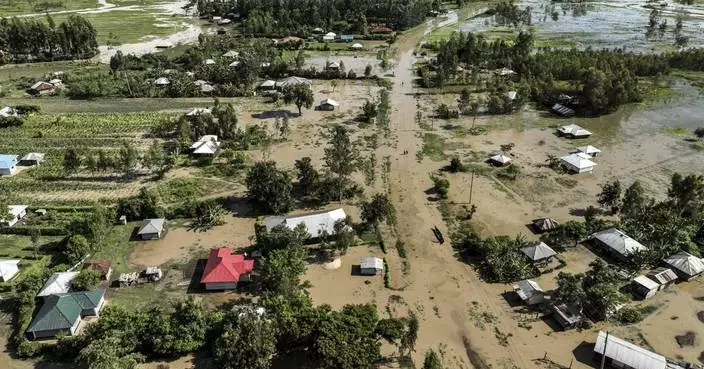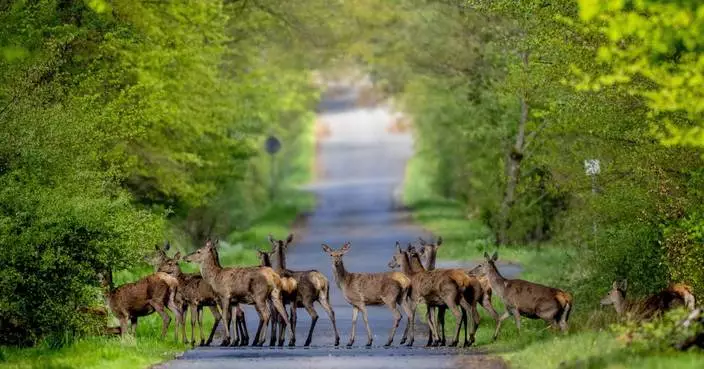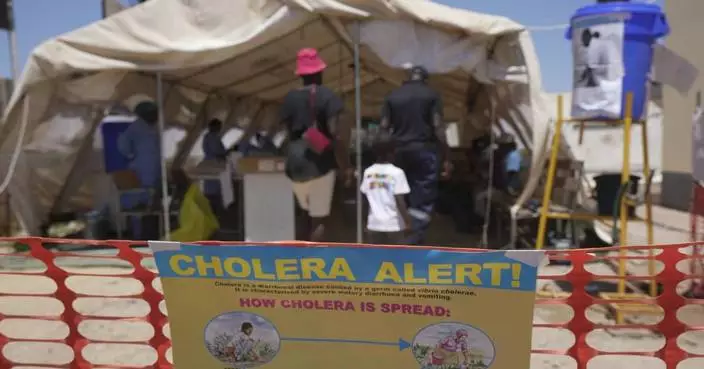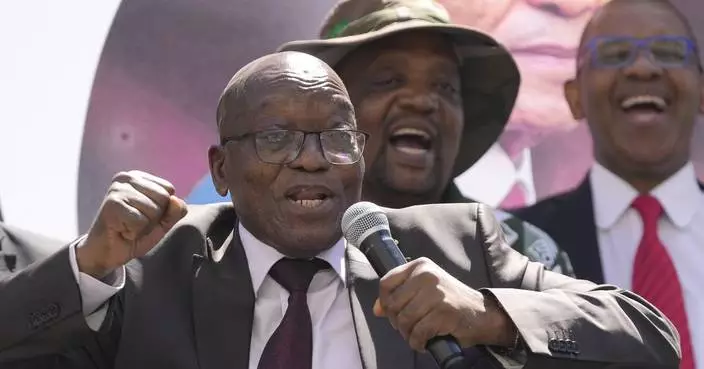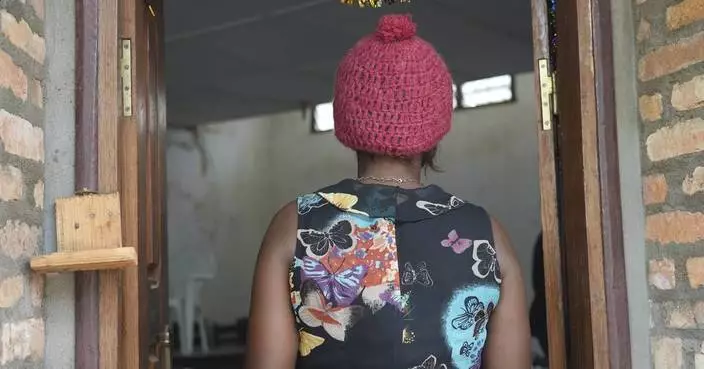For years African leaders have toyed with the idea of free movement by citizens across the continent, even raising the possibility of a single African passport.
Now some African countries are taking bold steps to encourage borderless travel that could spur trade and economic growth on a continent in desperate need of both.

FILE - In this Tuesday, Nov. 28, 2017 file photo, the crowd watch as Kenyan President Uhuru Kenyatta, center, and Deputy President William Ruto, center right, appear on a video screen at his inauguration ceremony at Kasarani stadium in Nairobi, Kenya. (AP Photo/Ben Curtis, File)
Kenyan President Uhuru Kenyatta announced during his inauguration last week that the East African commercial hub will now give visas on arrival to all Africans. That follows similar measures by nations including Benin and Rwanda.
"The freer we are to travel and live with one another, the more integrated and appreciative of our diversity we will become," Kenyatta said.
The African Union has cheered such steps, calling it the direction the 54-nation continent needs to take. "I urge all African states that have not yet done so to take similar measures," AU Commission chairman Moussa Faki Mahamat said on Twitter after Kenya's announcement.
Trade among African countries is at just 16 percent, while trade among European Union states is at 70 percent, Mahamat told AU trade ministers on Friday.
For a continent whose leaders often speak fondly of "African brotherhood" and once pondered the idea of a United States of Africa, the visa policies of many countries for many years suggested little progress in implementing the continent-wide, visa-free ideal advocated by the AU.
Africans can get a visa on arrival in 24 percent of African countries, yet North Americans, for example, have easier access on the continent, according to a 2017 report on visa openness by the African Development Bank. African Union figures show Africans need visas to travel to 54 percent of the continent.
Free migration of people across the continent would help in talent exchange as well as trade, said Ali Abdi, the Uganda chief of mission at the International Organization for Migration. Countries may have to invest more in border patrols but "the benefits far outweigh the costs, in my view."
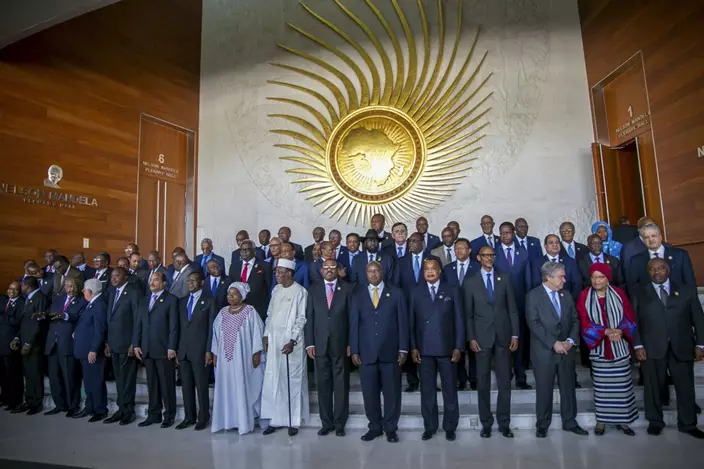
FILE - In this Monday, Jan. 30, 2017 file photo, participants gather for a group photo for the 28th Ordinary Session of the Assembly of the African Union, in Addis Ababa, Ethiopia. (AP Photo/Mulugeta Ayene, File)
Kenya's decision is a "good move and it's progressive," said Godber Tumushabe with the Uganda-based Lakes Institute for Strategic Studies. "It should have been done a long time ago."
Change is coming, and not just in East Africa. While visiting Rwanda last year, Benin's President Patrice Talon said his West African country would no longer require visas for other Africans. He said he was inspired by Rwanda, whose government started issuing visas on arrival to Africans in 2013 and recently announced that in 2018 citizens of all countries will benefit from the policy.
"We are happy that other African countries are opening their borders up for Africans to increase foreign investments," said Olivier Nduhungirehe, a deputy foreign minister in Rwanda in charge of regional integration. Opening borders will spur economic prosperity for the entire continent, he said.
Some African countries are going visa-free by region first. Weeks ago, the Central African Economic and Monetary Community removed visa requirements for citizens of its six members.
Many African countries rely heavily on tourism for foreign currency. Kenya's new visa policy was welcomed in a country where the threat by Islamic extremists based in neighboring Somalia has deterred some international travelers.
Offering visas on arrival to all Africans could attract the continent's small but growing middle class.
"Visa-free travel for Africans into Kenya is a great move by the president and a strategic one for the tourism industry," said Bobby Kamani, who runs the popular Diani Reef Beach Resort and Spa in the second-largest city, Mombasa. "The president's bold move couldn't have come at a better time when the tourism sector has experienced uncertainty and is now on recovery mode."
Conflict and sharp income disparities in many countries are among other factors slowing the adoption of visa-free policies. Even the African Union passport, launched in July 2016 and given to some heads of state, is yet to be offered to citizens.

FILE - In this Tuesday, Nov. 28, 2017 file photo, Kenyan President Uhuru Kenyatta waves from behind bulletproof glass as he arrives for his inauguration ceremony at Kasarani stadium in Nairobi, Kenya Tuesday, Nov. 28, 2017. (AP Photo/Ben Curtis, File)
Some North African countries, notably Libya, struggle with a flow of impoverished African migrants trying to make their way to Europe. South Africa, one of the continent's top economies, has seen a sometimes violent backlash against African immigrants amid fears about crime and the taking of jobs. Nigeria, Africa's most populous country and another of its strongest economies, maintains visa requirements before arrival for many nations across the continent.
Still, many are hopeful for a borderless Africa and urge those regional leaders to follow Kenya's lead.
"Is a new wind blowing across #Africa?" Wolfgang Thome, a tourism consultant who once led the Uganda Tourism Association, tweeted. "When will the last walls fall? #Nigeria we are waiting!"
BELEM, Brazil (AP) — The bodies of nine migrants found on an African boat off the northern coast of Brazil’s Amazon region were buried Thursday with a solemn ceremony in the Para state capital of Belem.
Fishermen off the coast of Para found the boat adrift April 13, carrying the bodies that were already decomposing. Brazilian officials later said documents found in the vessel indicated that the victims were migrants from Mali and Mauritania and that the boat had departed the latter country after Jan. 17.
Brazil's federal police said later that the bodies were of adults or teenagers whose exact age could not be determined. Agents found two documents — an identity card from Mauritania and a register of entry in Mauritania that belonged to someone from Mali.
The deceased were buried in a secular ceremony organized by a number of groups involved in their recovery, such as the U.N. Refugee Agency, the Red Cross and the International Organization for Migration, as well as Brazilian police, navy and civil defense agencies.
A tropical rain fell as their coffins were lowered into graves dug into the earth and those present watched in respectful silence.
Their roughly 12-meter (39-foot) boat was carrying 25 raincoats and 27 mobile phones, suggesting the original number of passengers was significantly higher. This also implies that people of other nationalities may have been among the deceased, local officials have said.
Brazil's federal police said it is unlikely they will extract any information from the phones due to the long time of oxydation they were subjected to. The force also added they had found paper notes in the boat with phone numbers from Mauritania, Mali and Congo. A kind of stove and two containers that could have carried water or fuel were also among the remains.
It was a rustic blue-and-white fiberglass boat that, when found, had neither motor, tiller nor rudder. Its canoe shape is similar to Mauritanian fishing boats often used by migrants fleeing West Africa and aiming to enter the European Union via Spain’s Canary Islands.
An Associated Press investigation published last year revealed that in 2021 at least seven boats from northwest Africa were found in the Caribbean and Brazil. All carried dead bodies, like the vessel found in Para.
So far, none of the victims have been identified. Authorities said the manner of their burial would allow for subsequent exhumations in case families of the deceased were located and wished to transfer the bodies back to their home countries.
Brazil’s criminology institute in the capital Brasilia is carrying out forensic examinations of the remains, and the Federal Police say they are in contact with Interpol and foreign organizations to provide eventual results.
This year the number of people attempting the crossing from the northwest coast of Africa to the EU has seen a 500% spike, with the majority departing from Mauritania, according to Spain’s interior ministry. But it is a dangerous route with strong Atlantic winds, and boats that go off course can stay adrift for months and be swept away to distant destinations, often leading migrants to die of dehydration and malnutrition.
The reasons pushing people toward such boats are varied and intertwined: a lack of jobs and prospects of a better life, impacts of climate change, growing insecurity and political instability, among others.
More than 14,000 African migrants have reached the Canary Islands so far this year, according to the Spanish ministry. In February, the EU and Mauritania signed a 210 million euro ($225 million) deal aimed at cracking down on people smuggling and deterring migrant boats.
With hundreds more West African migrants reported missing, families in Mauritania have set up a commission to search for loved ones, and are anxiously awaiting information from Brazil.
Bachirou Saw of Mauritania buried one of his nephews earlier this year who had died during the arduous Atlantic crossing shortly after reaching the Spanish island of El Hierro. He’s still looking for another nephew, Kadija Saw, who departed in January and is nowhere to be found. He’s following news from Brazil closely.
Saw, who also has Spanish citizenship and immigrated to Europe by plane 30 years ago when it was easier to get a visa, said he’s been trying to convince young men not to emigrate by boat. He created a WhatsApp group to alert migrants to the perils of the ocean voyage and to share information with desperate relatives, and has counted at least 1,500 missing in the last six months from Mauritania, Mali and Senegal. While most of the migrants embarking to Europe are men, there is an increasing number of women getting aboard boats, too.
“I have their ID’s on my phone,” said Saw, who receives messages every day from families looking for their loved ones. Together with others, they’ve organized trips to Morocco to look inside prisons and morgues. Moroccan authorities often intercept migrants trying to reach Spain and detain them before deporting them. But Saw’s nephew wasn’t there either. He also visited the Canary Islands to check the morgues there.
Saw’s sister is desolate. “Every day she buys credit to listen to our audios, she lives for this, she doesn’t eat, she is thin, just thinking about her son,” Saw said. And she’s not alone.
“It’s very sad, half of the villages are dancing because their sons have arrived (in Spain),” he said, “but the other half cries because they’ve lost their sons in the ocean.”
Carneiro reported from Rio de Janeiro. Associated Press writer Renata Brito contributed from New York.
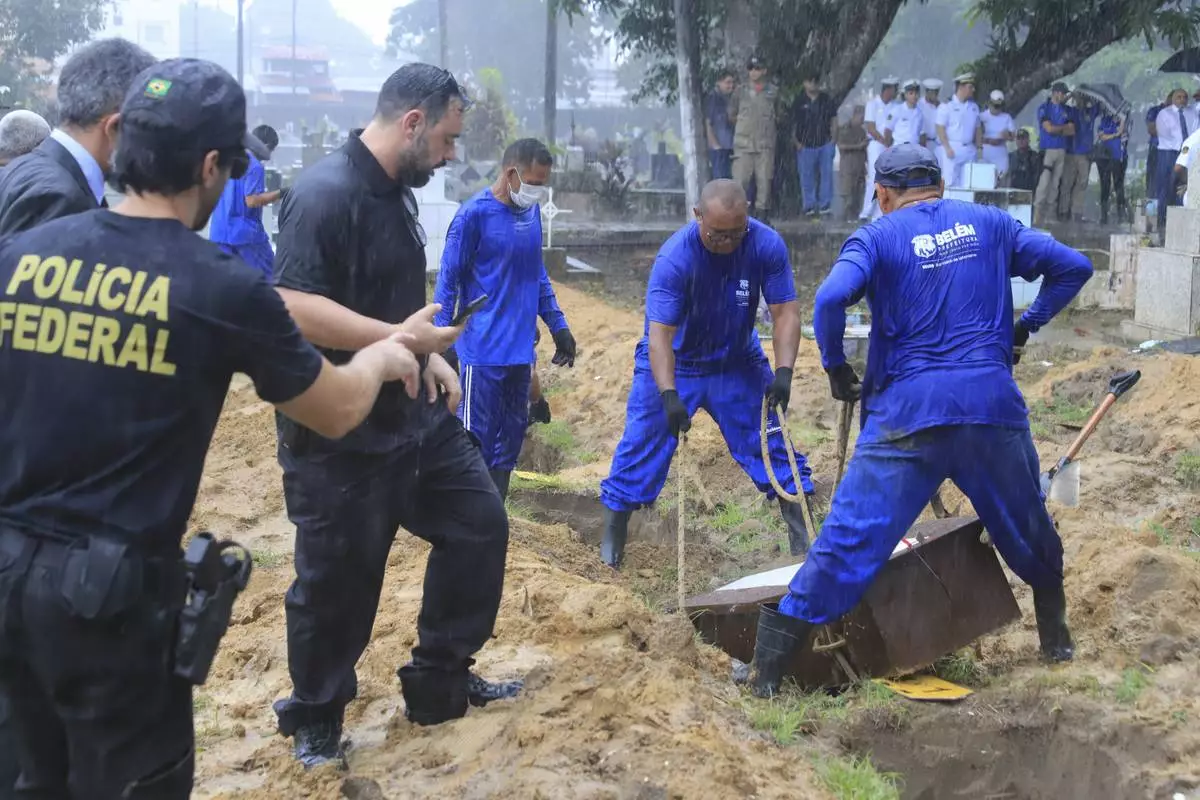
Cemetery workers lower into a grave, a coffin that contains the remains of an unidentified migrant, at the Sao Jorge cemetery, in Belem, Para state, Brazil, Thursday, April 25, 2024. The bodies of nine migrants found on an African boat off the northern coast of Brazil's Amazon region were buried Thursday with a solemn ceremony. (AP Photo/Paulo Santos)
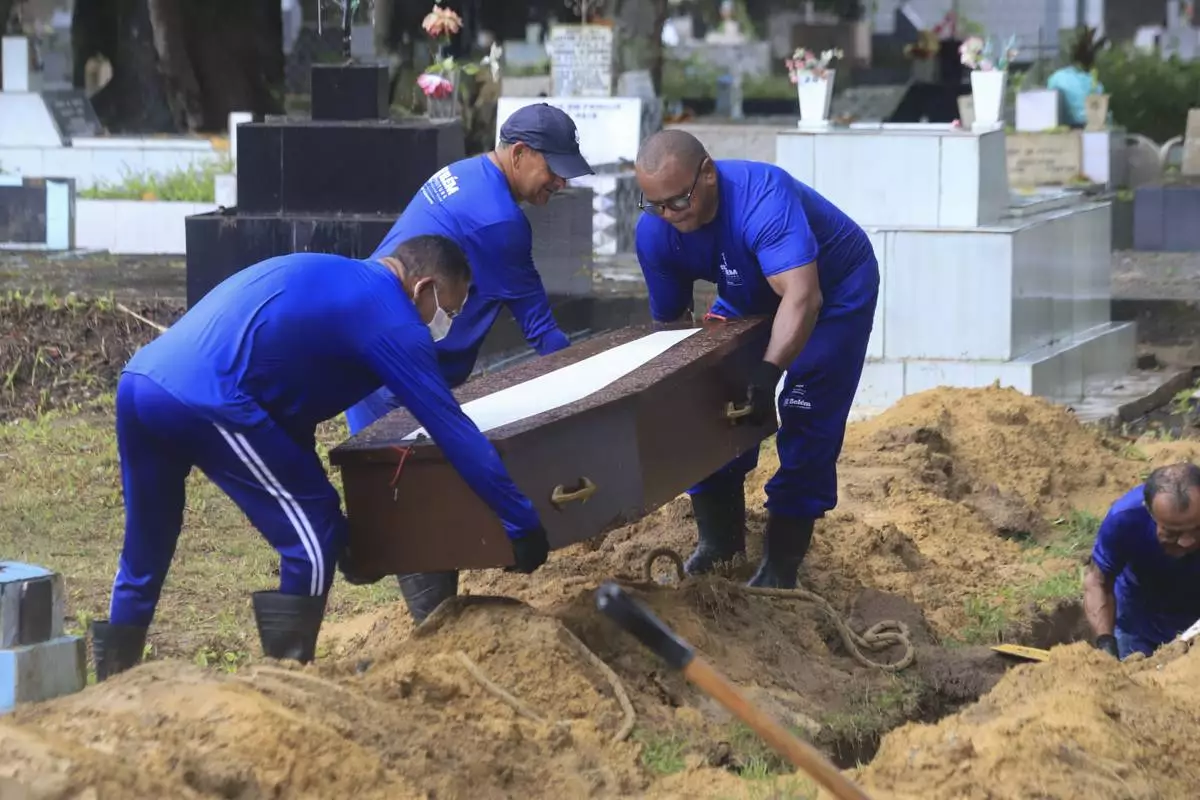
Cemetery workers lower into a grave, a coffin that contains the remains of an unidentified migrant, at the Sao Jorge cemetery, in Belem, Para state, Brazil, Thursday, April 25, 2024. The bodies of nine migrants found on an African boat off the northern coast of Brazil's Amazon region were buried Thursday with a solemn ceremony. (AP Photo/Paulo Santos)
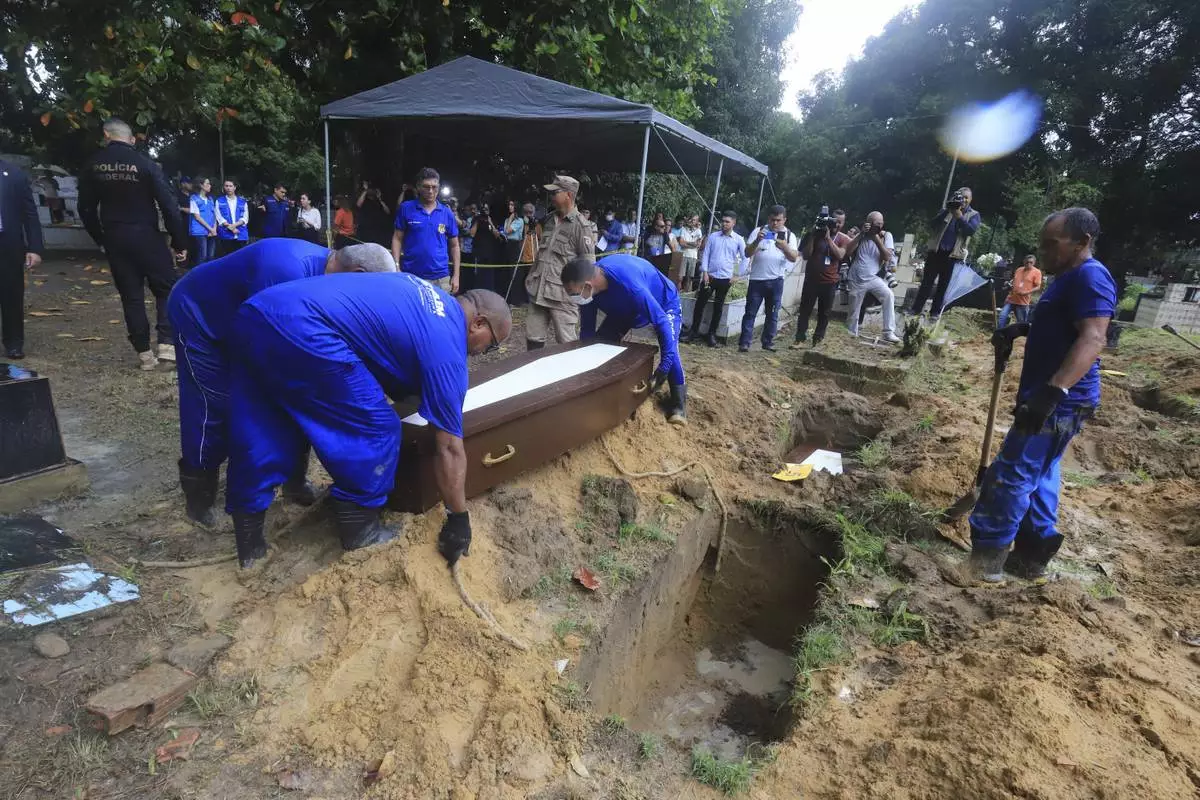
Cemetery workers lower into a grave, a coffin that contains the remains of an unidentified migrant, at the Sao Jorge cemetery, in Belem, Para state, Brazil, Thursday, April 25, 2024. The bodies of nine migrants found on an African boat off the northern coast of Brazil's Amazon region were buried Thursday with a solemn ceremony. (AP Photo/Paulo Santos)
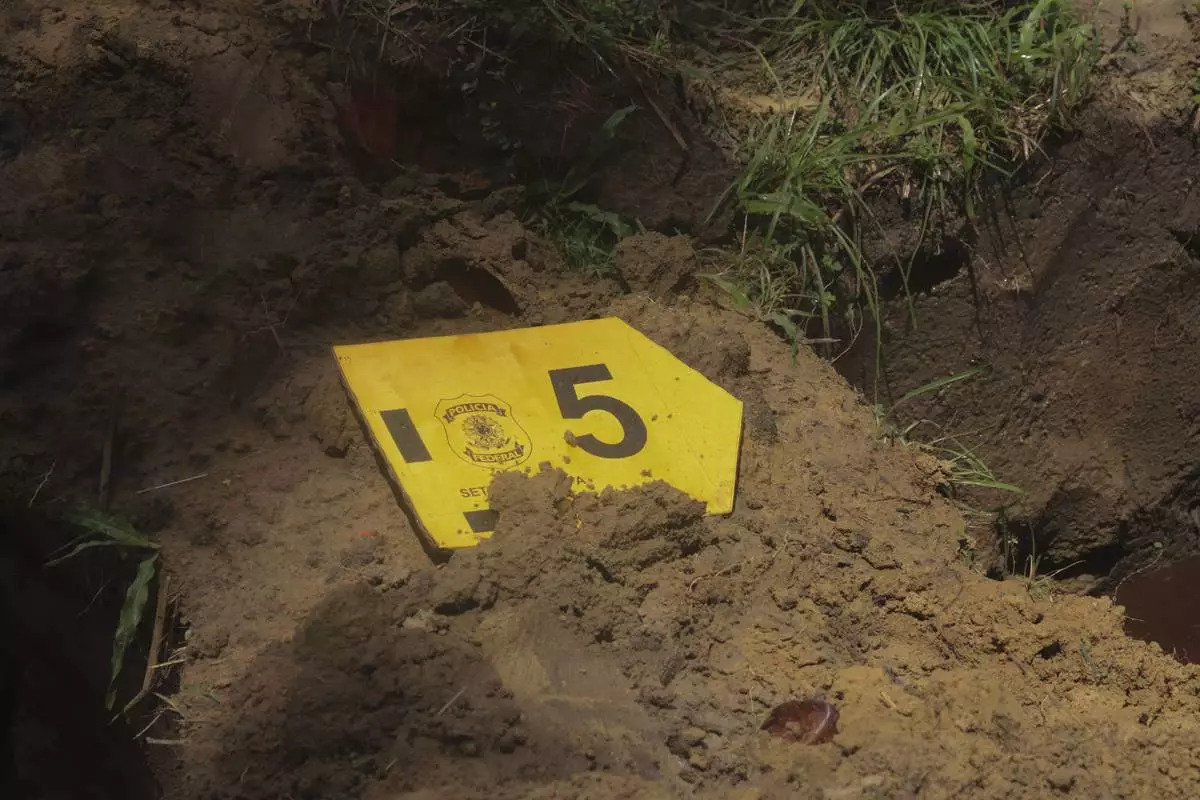
A label with the number 5 to mark one of nine unidentified migrants, sits on a freshly dug grave during a burial service, at Sao Jorge cemetery, in Belem, Para state, Brazil, Thursday, April 25, 2024. The bodies of nine migrants found on an African boat off the northern coast of Brazil's Amazon region were buried Thursday with a solemn ceremony in a cemetery. (AP Photo/Paulo Santos)
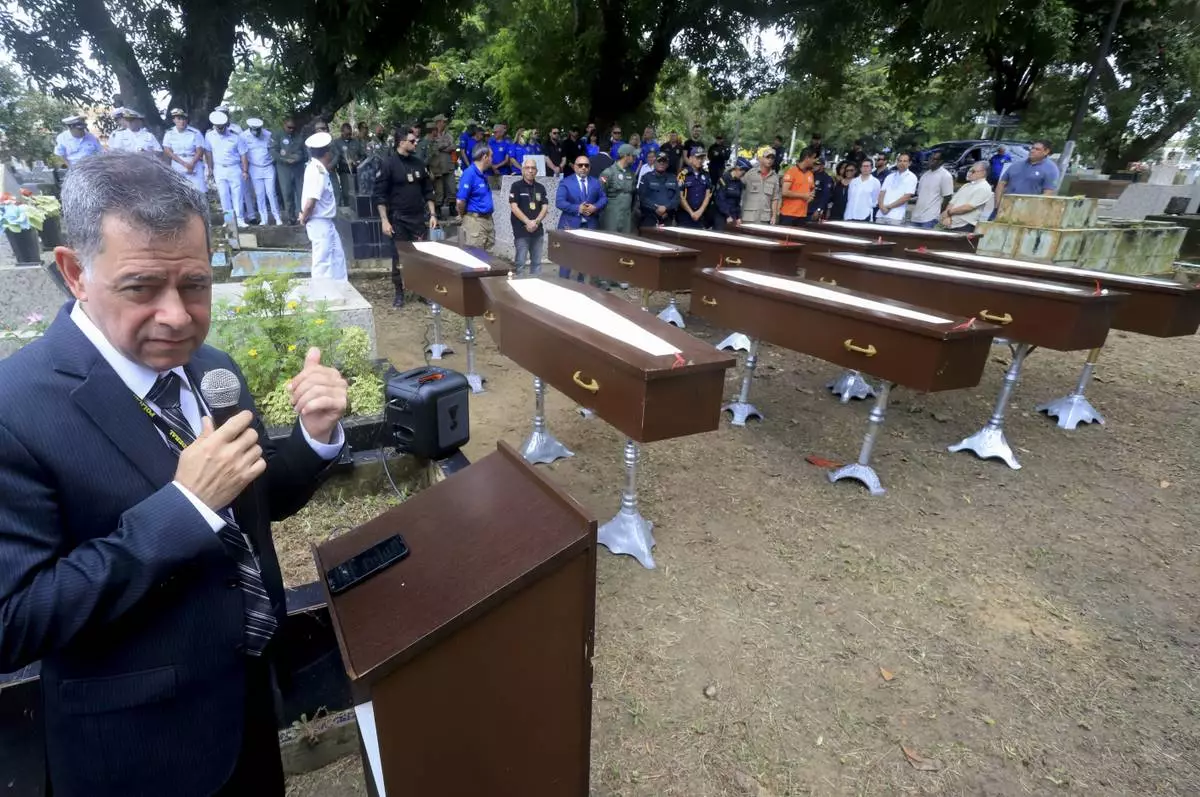
Federal police superintendent Jose Roberto Peres speaks during a burial service for nine unidentified migrants, at the Sao Jorge cemetery, in Belem, Para state, Brazil, Thursday, April 25, 2024. The bodies of nine migrants found on an African boat off the northern coast of Brazil's Amazon region were buried Thursday with a solemn ceremony. (AP Photo/Paulo Santos)
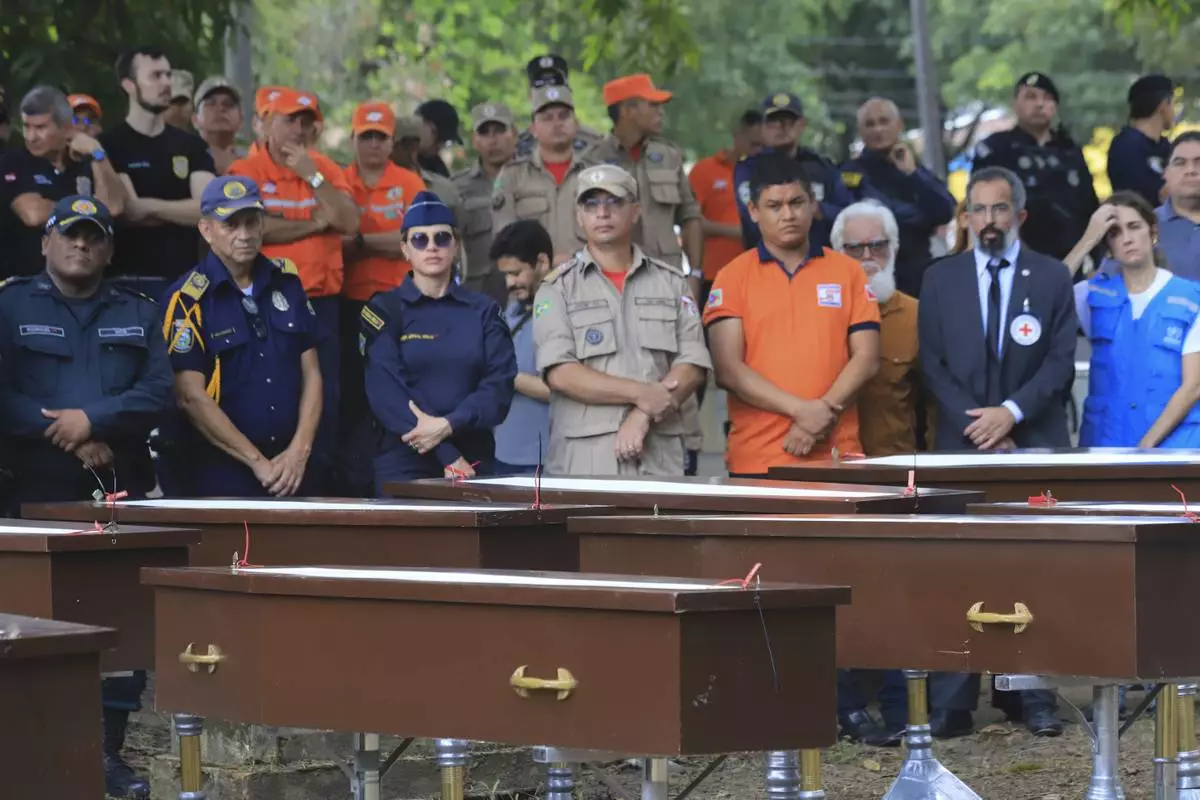
Police and firefighters attend the burial of nine unidentified migrants at the Sao Jorge cemetery, in Belem, Para state, Brazil, Thursday, April 25, 2024. The bodies of nine migrants found on an African boat off the northern coast of Brazil's Amazon region were buried Thursday with a solemn ceremony. (AP Photo/Paulo Santos)
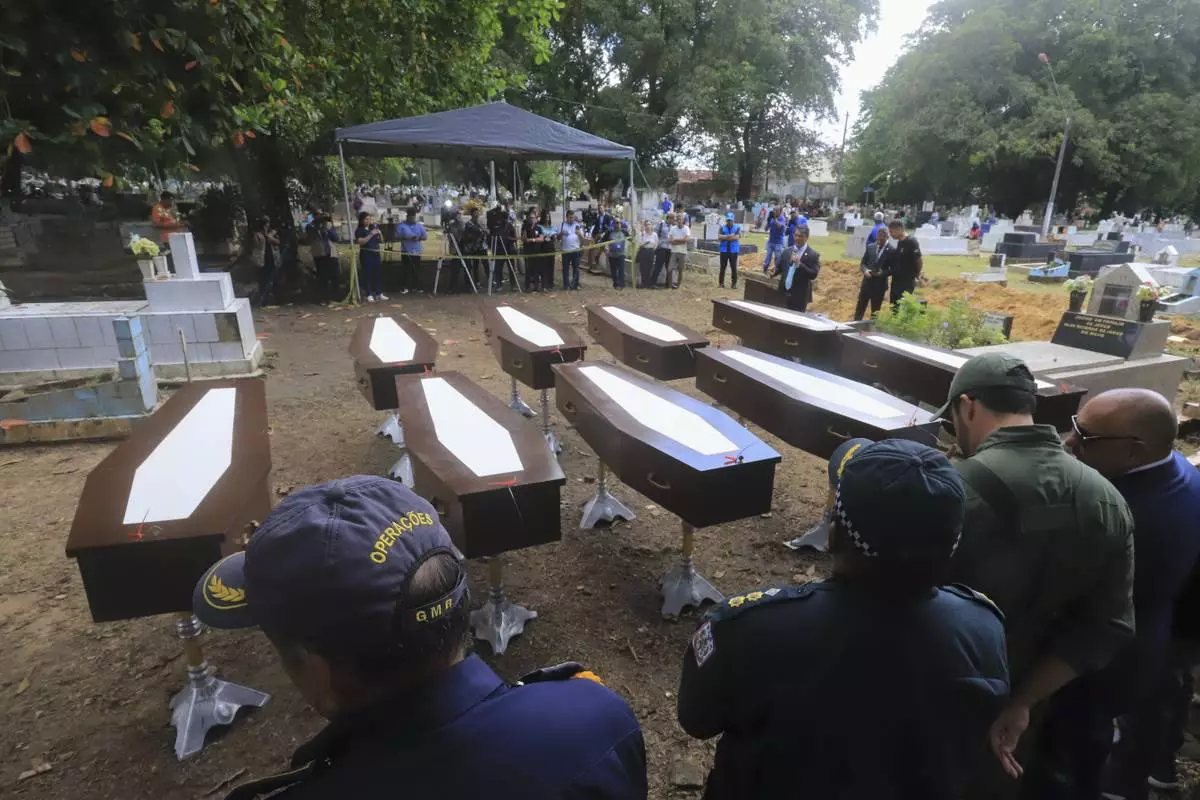
Authorities stand next to the nine coffins that contain the remains of unidentified migrants, at the Sao Jorge cemetery, in Belem, Para state, Brazil, Thursday, April 25, 2024. The bodies of nine migrants found on an African boat off the northern coast of Brazil's Amazon region were buried Thursday with a solemn ceremony. (AP Photo/Paulo Santos)
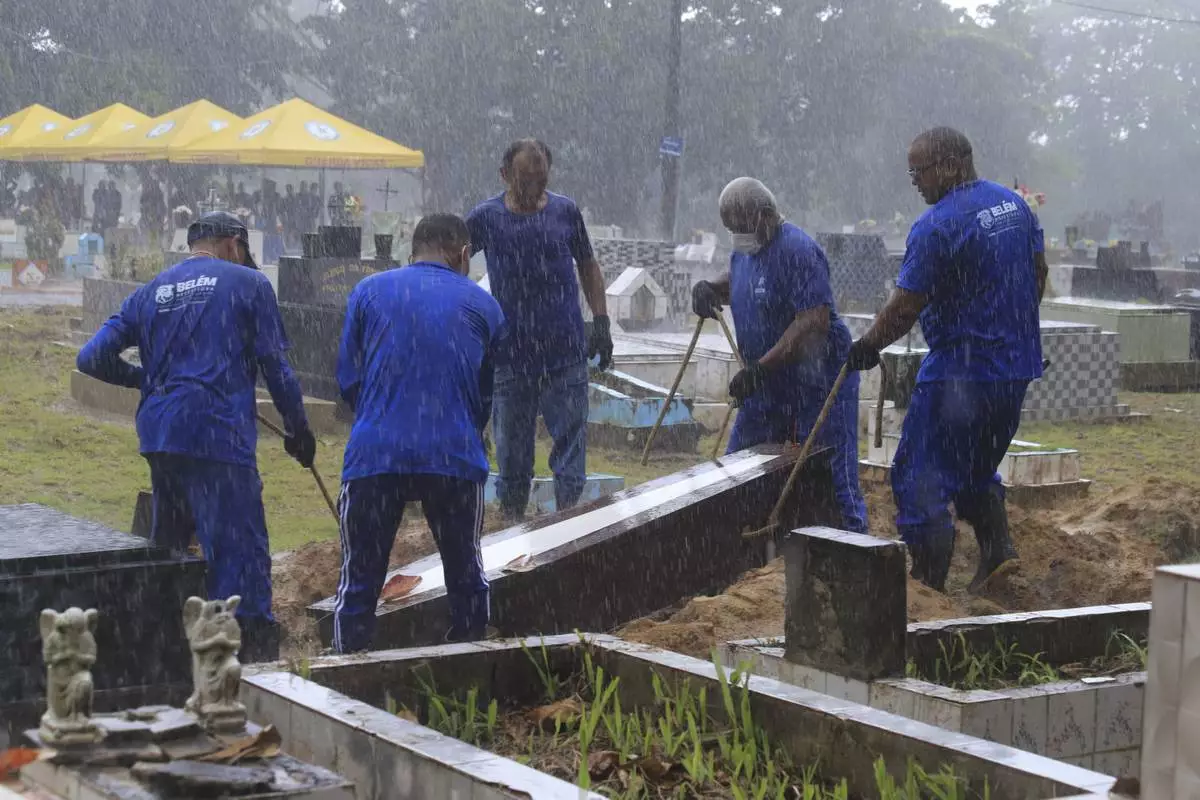
Cemetery workers carry the coffin that contains the remains of an unidentified migrant, at the Sao Jorge cemetery, in Belem, Para state, Brazil, Thursday, April 25, 2024. The bodies of nine migrants found on an African boat off the northern coast of Brazil's Amazon region were buried Thursday with a solemn ceremony. (AP Photo/Paulo Santos)














